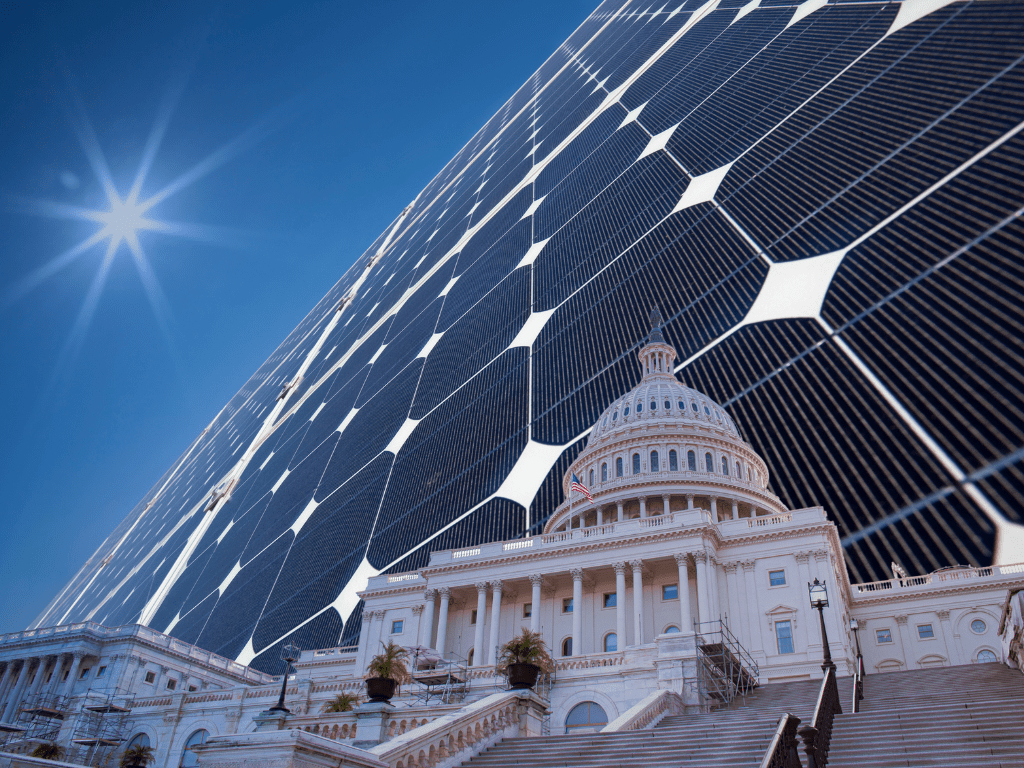The Senate’s Inflation Reduction Act of 2022 will give the U.S. solar industry the massive tax breaks it needs in light of the constant reduction of tariffs and anti-dumping cases against Chinese solar companies.
In essence, if the Act becomes law, U.S.-based solar manufacturers would essentially be paid directly from the Treasury upon production of pieces and parts that make up the solar supply chain.
All sides of the solar debate have been arguing for this, including the installation companies who are generally in favor of more imports.
Senators Joe Manchin (D-WV) and Chuck Schumer (D-NY) announced a deal on Wednesday that includes roughly $370 billion in energy and climate spending, according to Politico. The Inflation Reduction Act includes a 10-year extension of the solar tax credit at 30% and may include direct pay for nonprofit and governmental entities, according to Solar Power World.
The solar provision stems from a bill sponsored last year by Sen. Jon Ossoff (D-GA) called the Solar Energy Manufacturing for America Act. If passed, the law would help incentive investments in a deeper solar supply chain in the U.S. To date, the U.S. is primarily a manufacturer of solar panels and an importer of solar cells. The solar cell supply chain is mostly based in China, with significant exposure to polysilicon sources from Xinjiang, known for prison labor of Uyghur Muslims there.
The Biden administration has consistently undermined solar since taking office, so these production-based tax credits are a big win for domestic manufacturers. Biden gutted the Section 201 safeguard tariffs on Chinese solar imports, and he also sabotaged the Commerce Department’s investigation into illegal trade activity by Chinese multinationals in Southeast Asia.
Long-term policies like this domestic solar manufacturing tax credit will reduce dependence on China, providing U.S. companies invest in building out more of the supply chain here, rather than just a singular focus on solar panels.
Could this lead to a rollback of the Section 201 tariffs someday? For now, those tariffs are safe. They were renewed earlier this year for another four years.
The White House and Congress must recognize, however, that trade is a critical component to boosting U.S. solar manufacturing. The U.S. will never be able to out-subsidize China. Moreover, trade cases regarding dumping and circumvention of tariffs should also be part of the toolkit and never be cast aside should these tax credits get put to use under the Inflation Act. As it is now, the Biden administration used inflation and supply chain woes – caused by China itself – to waive for two years the anti-dumping case against Chinese solar makers in Vietnam, Cambodia, Thailand, and Malaysia. As a result, the tax credits put forth in the Inflation Reduction Act stop the bloodletting caused by weaker solar safeguards and the White House’s favoring of China solar in the past.
This bill gives U.S. solar a step up the ladder towards greater domestic market share after spending much of the year sawing off the rungs to that ladder.
Next up: it is likely that the Senate will pass the bill. Only a simple majority is needed as this is part of budget reconciliation with a couple of bills thrown in there. After that, it will go to House. If the bill passes, President Biden will sign it into law.
It will be a big win for solar if it passes, and CPA believes that at this time that it will reach the president’s desk by September.
“We have a generational and historic obligation to…transition from fossil fuel combustion to clean and renewable energy,” Sen. Ossoff said in a statement in November when his bill passed the House. “We need to be building and manufacturing this technology here in the United States, reduce our reliance on imports from China, and meet the moment,” he said.













